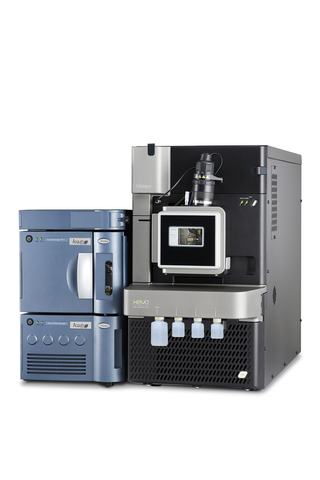
MONTEREY, Calif.– Waters Corporation (NYSE:WAT) today unveiled its next generation Xevo TQ Absolute IVD mass spectrometer, expanding its family of MassTrak IVD LC-MS/MS Systems for clinical diagnostic applications.
The powerful analytical performance of the Xevo TQ Absolute IVD mass spectrometer is up to five times more sensitive for quantifying clinical analytes than similar commercial instruments on the market. This sensitivity enables clinical laboratories to detect and measure trace level analytes within a sample at the lowest detection levels than previously possible.iv It can extend the testing capabilities of the clinical laboratory to include lower volume samples obtained in less-invasive assays such as saliva, breath, and dried blood spots. The system also enables clinical laboratories to expand their test menu to include multiplex panels and large molecules.
“Waters’ MassTrak IVD systems gives clinical diagnostic laboratories highly precise and flexible options that ultimately enable clinicians to provide better patient care,” said Jianqing Bennett, Waters Corporation Senior Vice President of the Waters Clinical Business Unit. “Adding the Xevo TQ Absolute IVD to the MassTrak IVD family offers customers class-leading sensitivity and analytical performance. Waters is uniquely positioned to enable clinical laboratories to develop reliable test methods for difficult analytes, helping them expand their capabilities to manage emerging remote sampling techniques.”
The new MassTrak LC-MS/MS IVD system includes the ACQUITY UPLC I-Class PLUS liquid chromatography instrument with the Xevo TQ Absolute IVD mass spectrometer. The ACQUITY UPLC I-Class PLUS System is designed to deliver rapid and accurate sample analysis to enhance the sensitivity of any mass spectrometer and simplify the characterization of the most complex sample. The Xevo TQ Absolute IVD System provides more consistent instrument-to-instrument performance, with a user-friendly design that maximizes service uptime. Its innovative design is also 45% smaller and uses 50% less nitrogen gas and electricity than comparable tandem quadrupole-mass spectrometry (TQ-MS) systems,v making it ideal for hospital labs and independent commercial labs with both sustainability and business growth goals to meet.

